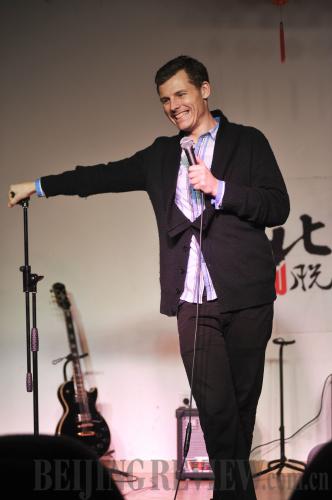|
 |
|
TIME TO RELAX: Des Bishop hosts a stand-up comedy show at Right Here Club in Beijing's Wudaokou on February 26 (WEI YAO) |
Life in a first-tier Chinese city can be stressful, and in Beijing there is a growing market for one of the most powerful antidotes to a bad mood: laughter.
Each Wednesday night, in a dimly lit dive bar called Hot Cat Club, hidden inside a hutong (lane) neighborhood south of the Lama Temple, around 20 amateur stand-up comedians are given five minutes each to get on stage at an open mic to entertain an audience of around 80 people. A crew of around a dozen seasoned comedians practice their routines before going on to perform at paid weekend gigs held at more spacious locales.
The host, a 26-year-old American named David Fertitta, introduces new comics and performs some of his own material between sets. After warming up the crowd, he called to the stage a first-time comedian, who paced back and forth on stage, occasionally peeking into his notebook to recall jokes that were, to him, hilarious—at the time. He trudged through a rite of passage known in stand-up parlance as "bombing," or failing to connect with the audience, the attention of which a comic must command and please or risk being ignored—or worse yet, openly ridiculed.
After the newcomer stepped off the raised platform and out of the spotlight, Fertitta introduces one of Beijing's most promising stand-up comedians, 28-year-old Gus Tate, a native of Kentucky, the United States. He has a mostly "clean" set, which is free of the more crude content other comics often use to shock their listeners into hysterics. Tate instead charms the audience with anecdotes, clever observations, and lessons from his interactions with China.
Having performed stand-up regularly in English for the past year, he said he'd like to try performing in Chinese. "The language barrier makes certain things funny that wouldn't necessarily by funny in your native language," he said, adding that the spectacle of a foreigner on stage, in a way, primes a Chinese audience to laugh.
Tate believes his sense of humor is shared not just with his fellow expats but with diverse crowds of both Chinese and foreigners. "I want to believe that things I think are funny are just funny," he said.
Big shots in town
Stand-up comedy first became popular in the United States following the appearances of comedians on late night television talk shows such as Johnny Carson's, and has seen a resurgence in recent years as the Internet allows performers to reach wider audiences through video streaming sites like Youtube and social networking like Twitter.
In a similar fashion, the Internet has created opportunities for comedians in China to find outlets for creative expressions beyond the standard television format, which involve producers and outside pressure throughout the script-writing process. Jesse Appell, an American who has spent time in China researching comedic forms and appeared on China Central Television as a crosstalk performer, said stand-up has been getting bigger and bigger as more people are willing to devote larger budgets to create content designed to be put on the Internet. "At this point," he said, "TV and the Internet are almost interchangeable."
|
